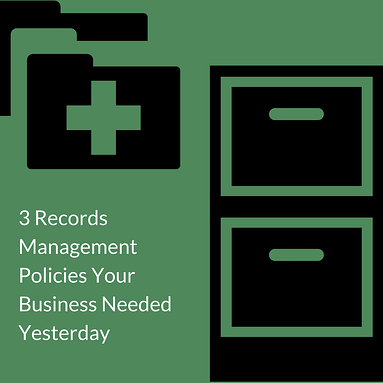3 Records Management Policies Your Business Needed Yesterday
Wed, Jan 14, 2015
By: Jim Beran

In regulated industries, such as healthcare, everyone understands the importance of confidentiality and security when it comes to records and documentation. Generally, standards for securing documents are set by state or federal law, and non-compliance can be costly. For some businesses, the potential danger, cost, and inconvenience associated with handling their own records management isn't at the top of the priority list. But it should be.
Here are three policies your business should implement to ensure secure and efficient document management, and some tips for putting them into practice.
Manage the life cycle of all documents
For many practical, legal, and regulatory reasons, various documents have to be stored or destroyed on specific time schedules. For example, tax records should be kept for seven years, while other financial documents can be destroyed sooner or kept indefinitely. Keeping track of how each type of document should be handled to ensure your business is in compliance with laws and standards, and protected against other potential problems, can be a difficult and time-consuming job.
Many companies have found that a professional records management company can be a powerful ally that puts them back in control, saving them time and money in the process. Services such as records retention scheduling, storage, and destruction, can offer peace of mind and allow you to focus on other important aspects of your business.
Move toward a paperless office
Today's technology makes the concept of a mostly paperless office well within the reach of many businesses. This can mean an important environmental impact as using less paper reduces deforestation and a company's carbon footprint. It's also an excellent way to make necessary records more readily accessible via computer or mobile devices no matter where you are in relation to the hard copy.
For companies with a backlog of paper records they need to refer to routinely, the first step in going paperless is taking advantage of document scanning services that can quickly and conveniently transfer paper records into secure electronic documents that can be accessed via the web. If it's preferable to keep the hard copies for future use, secure off-site document storage offers an alternative to cluttered on-site file rooms or expensive separate storage facilities.
Once the backlog is processed, the company can move forward with purely digital documentation, if possible. Or, where paper is still required, businesses can arrange regular transfers of paper documentation on a weekly or monthly basis to have the hard copies scanned and stored securely.
Be prepared in case of an emergency
Natural disasters and other unfortunate events happen, and they can affect your business, sometimes completely unexpectedly. The best policy is to be prepared ahead of time to make sure you can recover from an emergency situation as quickly and painlessly as possible.
In the event of a hurricane, flood, or fire, records stored at your office can potentially be destroyed in a matter of minutes. What effect would that have on your business and your reputation?
An excellent option to consider is including document management in your disaster recovery planning. By making arrangements that include storing vital documents in an off-site location that is prepared to weather a disaster, you can ensure that important business documents will still be there after the disaster has passed and you are back in business.
In all these cases, a professional records management service can help your business be more efficient and more profitable. Find out these 4 things you need to know about your records retention schedule. And, contact us to find out more about records management for your business.